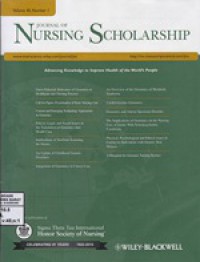
Jurnal
Typologies of Professional Identity Among Graduating Baccalaureate-Prepared Nurses
Purpose: The purpose of this study was to identify patterns of professional identity arising from the Quality and Safety Education for Nurses (QSEN) attitudes among students completing their prelicensure education.
Design: This mixed-method study used a modified Q-methodology design with a purposeful sample of 36 baccalaureate students graduating from three campuses of a large Midwestern university. Data were collected near the end of the spring semester of 2013.
Methods: Participants rank-ordered their agreement or disagreement with a set of subjective statements reflecting the 46 QSEN attitudes. Data were analyzed using a standard three-step approach that included generating a correlation matrix, completing factor analysis followed by varimax rotation, and calculating the factor scores.
Findings: Twenty statements represented consensus among the participants, and there was strong agreement that patient safety was both an individual and a team effort. Three professional identity typologies emerged: champions, collaborators, and individualists.
Conclusions: Evidence was found that these students internalized the QSEN attitudes to varying degrees, but more work may be needed to internalize all attitudes, especially those related to patient-centered care. Future research is needed to evaluate how students with different perspectives transition to practice and to explore other factors that comprise professional identity.
Clinical Relevance: This study expands on what is known about patterns of professional identity among nurses and helps provide a beginning framework for understanding the values new graduates bring to practice.
Availability
No copy data
Detail Information
- Series Title
-
Journal of Nursing Scholarship, Volume 46, Number 2 March 2014
- Call Number
-
(05) 610.5 WIL j
- Publisher
- Malden : Wiley-Blackwell., 2014
- Collation
-
Hlm. 125-133
- Language
-
English
- ISBN/ISSN
-
1527-6546
- Classification
-
(05) 610.5 WIL j
- Content Type
-
-
- Media Type
-
-
- Carrier Type
-
-
- Edition
-
Volume 46, Number 2
- Subject(s)
- Specific Detail Info
-
-
- Statement of Responsibility
-
-
Other version/related
No other version available
File Attachment
Comments
You must be logged in to post a comment
 Computer Science, Information & General Works
Computer Science, Information & General Works  Philosophy & Psychology
Philosophy & Psychology  Religion
Religion  Social Sciences
Social Sciences  Language
Language  Pure Science
Pure Science  Applied Sciences
Applied Sciences  Art & Recreation
Art & Recreation  Literature
Literature  History & Geography
History & Geography